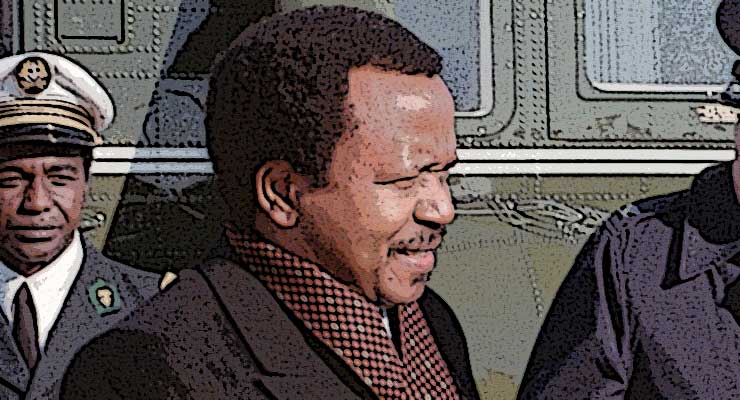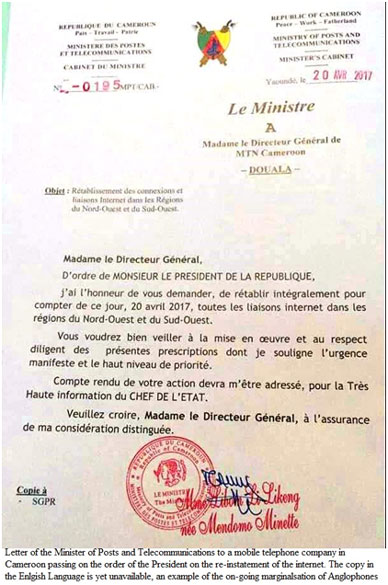
Local and international pressure forced President Paul Biya of Cameroon to order the reinstatement of the internet after shutting it down for 93 days
Following strikes by Anglophone[i] lawyers and teachers of the North West (NW) and South West (SW) Regions of Cameroon – regions coterminous with the territory of the former British Southern Cameroons (BSC) – in protest of the erosion of their education and legal systems inherited from British colonial rule in favour of the Jacobin education and legal systems practiced in the other eight regions – all francophone regions coterminous with former French Cameroun (FC) – the Government of President Paul Biya responded by flexing fascist-worthy tactics. Such tactics have included kidnapping leaders of the protesting Anglophone civil society organizations on grounds of terrorism for protesting and on grounds of secession for asking for a return to the Federation as was desired by BSC citizens in 1961, killing scores of innocent protesting Anglophone youths and then completely shutting down the internet in the entire former BSC territory on 18 January 2017 under the pretext of “threats to national security.”
 The people of BSC responded to the internet shutdown in a peaceful way and at no one point in time did they “go down on their knees” to beg for its reinstatement because they are aware it is their right to have access to the internet and not some privilege handed down to them by the clearly Machiavelli-oriented prince in Cameroon’s capital Yaounde.
The people of BSC responded to the internet shutdown in a peaceful way and at no one point in time did they “go down on their knees” to beg for its reinstatement because they are aware it is their right to have access to the internet and not some privilege handed down to them by the clearly Machiavelli-oriented prince in Cameroon’s capital Yaounde.
Anglophone lawyers have since November 2016 boycotted courts in the NW and SW Regions and Anglophone parents in these regions have kept their children away from school since November 2016 in protest of the bad faith shown by Biya and his “Black Cabinet.”[ii] Also, since 09 January 2017, Anglophones in the NW and SW have respected regular Ghost Towns[iii] in protest of the oppression of the regime and have either looked for or used other means of communicating with their circles and for business communication.
Following incessant advocacy from the Anglophone diaspora, academics, freethinkers and from the Anglophone leaders in exile now under the banner of the Southern Cameroons Ambazonia Consortium United Front (SCACUF), negotiations have been going on in diplomatic circles to force Biya to reinstate the internet. The result of this advocacy has been the recent visit to Cameroon by François Lounceny Fall, Representative of the United Nations Secretary General (UNSG) in Central Africa.
On 12 April 2017 Mr. Fall gave a Press Conference in Yaounde, Cameroon, in which he asked the Government of Biya to: free those kidnapped in the NW and SW Regions and whisked away for judgement in kangaroo military tribunals in Yaounde on trumped up charges; enter into frank dialogue with Anglophones and; take measures to progressively reinstate the internet.
Notwithstanding, in pursuance of madness, the regime of Biya hid behind the mask of a so called “Consortium of Parents whose Children are in the various Mission Academic Institutions” to fulfil its dream of dragging clergymen of the Catholic Church, Presbyterian Church (PCC) and the Cameroon Baptist Convention (CBC) in the NW and SW Regions to their regime-controlled Courts of First Instance of Bamenda (NW) and of Buea (SW) on summons drafted on trumped-up charges for court hearings scheduled on 21 April and 24 April 2017 respectively.[iv]
It would seem that the mobilization from the Christian population to storm the courts and alleged warnings from the Vatican have come to add to possible UN Sanctions to force Biya to order his Minister of Posts and Telecommunications (MINPOSTEL) to re-instate the internet on 20 April 2017, i.e. 93 days after it was shutdown. This has been the longest internet shutdown in African history.
In a communiqué on the Presidential order, the Minister of Communication (MINCOM) made more provocative statements in an attempt to help the Government to not lose face on this humiliation suffered by Paul Biya. MINCOM, Mr. Issa Tchiroma Bakary, known in many circles as the ‘Goebbels of Cameroon’, stated in this press release:
“Conditions that led to the temporary suspension of the internet in [the Anglophone regions of Cameroon] have evolved significantly and consequently the President [of the Republic] has asked MINPOSTEL to re-reinstate internet in the NW and SW Regions. The Government exhorts the populations of these regions to continue barring the way to extremists, secessionists and enemies of [La République (du Cameroun), LRC]. It remains understood that the Government reserves the right, when necessary, to take measures to prevent internet from being used to incite hatred and discord between Cameroonians or to disturb the peace.”
The people of the former BSC consider this statement a further provocation because the initial internet reaction after the re-instatement shows that they (BSC citizens) have not moved an inch on their resolve to see to it that they get justice and that their statehood is restored.
That the President asked MINPOSTEL to re-instate internet with a written order from MINPOSTEL emitted to mobile telephone companies to that effect only proves that Biya was the one who ordered the internet shutdown in the first place and has been caught in flagrant delicto of his dictatorial manoeuvres since there was no written order originally asking mobile telephone companies to shut-down internet.
Stating that the Government exhorts the people of the NW and SW to continue barring the way to extremists and secessionist and enemies of LRC is telling, in that Biya continues to call Anglophones derogatory names and continues to think that were there to be a split of former BSC territory from LRC today it would be a secession, and not a separation.
Some Background on British Southern Cameroon
It must be noted that LRC is the original name FC had at her independence on 01 January 1960 whereas the ill-negotiated federation required that an entirely new entity be formed between LRC and BSC to be called the Federal United Republic of Cameroon in which BSC would be in loose association with LRC.
The first President of LRC, Ahmadou Ahidjo tricked a naïve Premier of BSC, John Ngu Foncha, into accepting a Federal Union only on the terms of LRC with a constitution promulgated only by Ahidjo on 01 September 1961, one month before the independence of BSC on 01 October 1961 and backed by no Treaty of Union at the United Nations (UN) Secretariat.
Following the imposition of this Ahidjo-crafted Federal Constitution[v] on BSC territory Ahidjo could then easily abolish the Federation on 20 May 1972 through a wife-birthday-gift-referendum[vi] which was in contravention of article 47 of same Federal Constitution to form the United Republic of Cameroon (URC).
President Biya, who was appointed President by Ahidjo in 1982 through constitutional manipulation, decided, again, unilaterally, to revert to the name “La République du Cameroun” (LRC) by a decree of 04 February 1984. By this decree Biya consecrated the final annexation of BSC by LRC of 1960 and at the same time separated from BSC. This is the most powerful evidence that the presence of LRC administration in BSC territory is by force, a situation prevailing since October 1961.
It is against this backdrop[vii] that BSC nationals have suffered all the injustices and marginalisation that led to the strikes of 2016-2017 as the latest in several protests they have been organised over decades to draw attention to their plight. And it is also in pursuance of its repression and disregard for the right of Anglophones to the independence of their own State as granted by UN Resolution 1608 (XV) of 21 April 1961 that the LRC Biya-francophone-Beti-Boulou[viii] led Government of LRC exacted all the above mentioned crimes on Anglophones, including the internet shut down.
From Victory to Victory
Biya’s reinstatement of the internet is in no way linked to the untrue assessment made by MINCOM but rather is a result of the resolve of Anglophones in the NW and SW Regions, the strong advocacy of the Anglophone diaspora and the support of the international community. Now, Anglophones are resolved to see their Statehood restored.
The activism in this direction is therefore expected to continue and it is expected that more demands will come, among which are: withdrawal of the repugnant court action against the Anglophone clergymen; liberation of those kidnapped and taken to Yaounde; sentencing of the security forces who killed innocent civilians; implementation of the demands of the lawyers and teachers; suspension of all intentions to arrest activists who have gone on exile, and; negotiations for a two-State Federation as desired by the people of BSC when they, by their own freewill and good faith voted to join LRC in a plebiscite organised by the UN on 11 February 1961. Were the Biya regime to refuse to enter such negotiations with the up-coming interim Government of Southern Cameroons, the struggle by Anglophones and their new-found leadership might effectively enter an irreversible phase of effective separation from LRC.
Sources
[i] The term “Anglophone” is used in this article interchangeably with British Southern Cameroons (BSC) citizen or BSC national.
[ii] The term “Black Cabinet” was coined by Maurice Kamto, opposition figure in Cameroon, to identify the group of henchmen around Biya who work hard to promote his dictatorship.
[iii] During Ghost Towns all Anglophones in North West (NW) and South West (SW) are required by the protesting Anglophone civil society organizations and activist groups to stay at home in protest of the regime’s brutal repression and to make sure that schools don’t resume. These Ghost Towns have been respected since 09 January 2017
[v] The Constitution of the Federal Republic of Cameroon was an amendment of the Constitution of La République du Cameroun of March 1961.
[vi] The Ahidjo unilaterally proposed referendum of 1972 was organized on the 20th of May of that year, the birthday of Ahidjo’s wife, Germaine Ahidjo. In so doing, Ahidjo gave BSC to his wife as a birthday gift. This is spite of the highest order. Today, the 20th of May is celebrated as the National Day. That shows how baseless the political entity that styles itself The Republic of Cameroon today is.
[vii] See more about this backdrop in the articles written by Silence Dogood on the unfolding of the Anglophone Crisis.
[viii] Beti-Boulou alongside the Fang and Ntoumou constitute the ethnic groups that are governing Cameroon today. Biya is a Boulou from the South Region of Cameroon
Leave a Reply